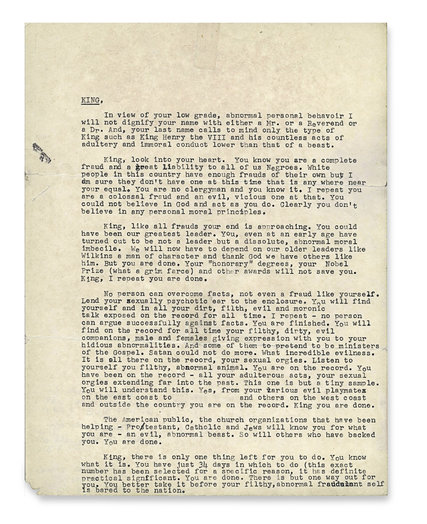
What an uncensored letter to M.L.K. reveals
The note is just a single sheet gone yellow with age, typewritten and tightly spaced. It’s rife with typos and misspellings and sprinkled with attempts at emending them. Clearly, some effort went into perfecting the tone, that of a disappointed admirer, appalled by the discovery of “hidious [sic] abnormalities” in someone he once viewed as “a man of character.”
The word “evil” makes six appearances in the text, beginning with an accusation: “You are a colossal fraud and an evil, vicious one at that.” In the paragraphs that follow, the recipient’s alleged lovers get the worst of it. They are described as “filthy dirty evil companions” and “evil playmates,” all engaged in “dirt, filth, evil and moronic talk.” The effect is at once grotesque and hypnotic, an obsessive’s account of carnal rage and personal betrayal. “What incredible evilness,” the letter proclaims, listing off “sexual orgies,” “adulterous acts” and “immoral conduct.” Near the end, it circles back to its initial target, denouncing him as an “evil, abnormal beast.”
 The unnamed author suggests intimate knowledge of his correspondent’s sex life, identifying one possible lover by name and claiming to have specific evidence about others. Another passage hints of an audiotape accompanying the letter, apparently a recording of “immoral conduct” in action. “Lend your sexually psychotic ear to the enclosure,” the letter demands. It concludes with a deadline of 34 days “before your filthy, abnormal fraudulent self is bared to the nation.”
The unnamed author suggests intimate knowledge of his correspondent’s sex life, identifying one possible lover by name and claiming to have specific evidence about others. Another passage hints of an audiotape accompanying the letter, apparently a recording of “immoral conduct” in action. “Lend your sexually psychotic ear to the enclosure,” the letter demands. It concludes with a deadline of 34 days “before your filthy, abnormal fraudulent self is bared to the nation.”
“There is only one thing left for you to do,” the author warns vaguely in the final paragraph. “You know what it is.”
When the Rev. Dr. Martin Luther King Jr. received this letter, nearly 50 years ago, he quietly informed friends that someone wanted him to kill himself — and he thought he knew who that someone was. Despite its half-baked prose, self-conscious amateurism and other attempts at misdirection, King was certain the letter had come from the F.B.I. Its infamous director, J. Edgar Hoover, made no secret of his desire to see King discredited. A little more than a decade later, the Senate’s Church Committee on intelligence overreach confirmed King’s suspicion.
Since then, the so-called “suicide letter” has occupied a unique place in the history of American intelligence — the most notorious and embarrassing example of Hoover’s F.B.I. run amok. For several decades, however, only significantly redacted copies of the letter were available for public scrutiny.
This summer, while researching a biography of Hoover, I was surprised to find a full, uncensored version of the letter tucked away in a reprocessed set of his official and confidential files at the National Archives. The uncovered passages contain explicit allegations about King’s sex life, rendered in the racially charged language of the Jim Crow era. Looking past the viciousness of the accusations, the letter offers a potent warning for readers today about the danger of domestic surveillance in an age with less reserved mass media.
 The F.B.I.’s entanglement with King began not as an inquiry into his sex life but as a “national security” matter, one step removed from King himself. In 1961, the bureau learned that a former Communist Party insider named Stanley Levison had become King’s closest white adviser, serving him as a ghostwriter and fund-raiser. The following year, Attorney General Robert Kennedy approved wiretaps on Levison’s home and office, and the White House advised King to drop his Communist friend. But thanks to their surveillance, the bureau quickly learned that King was still speaking with Levison. Around the same time, King began to criticize bureau practices in the South, accusing Hoover of failing to enforce civil rights law and of indulging the racist practices of Southern policemen.
The F.B.I.’s entanglement with King began not as an inquiry into his sex life but as a “national security” matter, one step removed from King himself. In 1961, the bureau learned that a former Communist Party insider named Stanley Levison had become King’s closest white adviser, serving him as a ghostwriter and fund-raiser. The following year, Attorney General Robert Kennedy approved wiretaps on Levison’s home and office, and the White House advised King to drop his Communist friend. But thanks to their surveillance, the bureau quickly learned that King was still speaking with Levison. Around the same time, King began to criticize bureau practices in the South, accusing Hoover of failing to enforce civil rights law and of indulging the racist practices of Southern policemen.mail the package to Atlanta.


